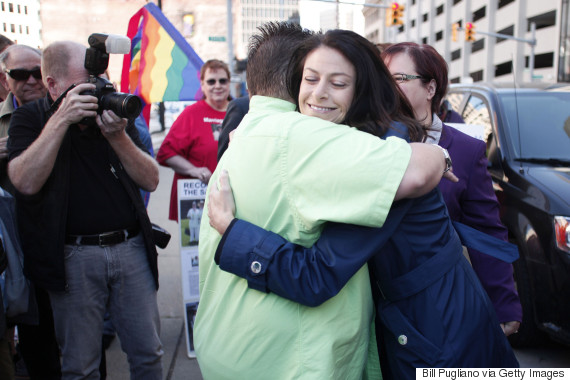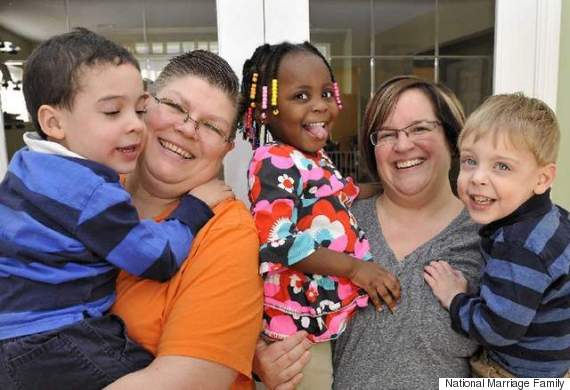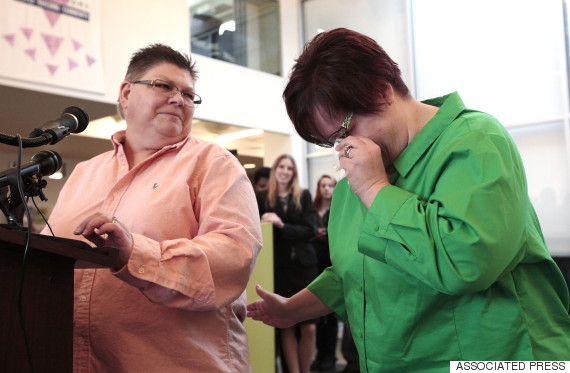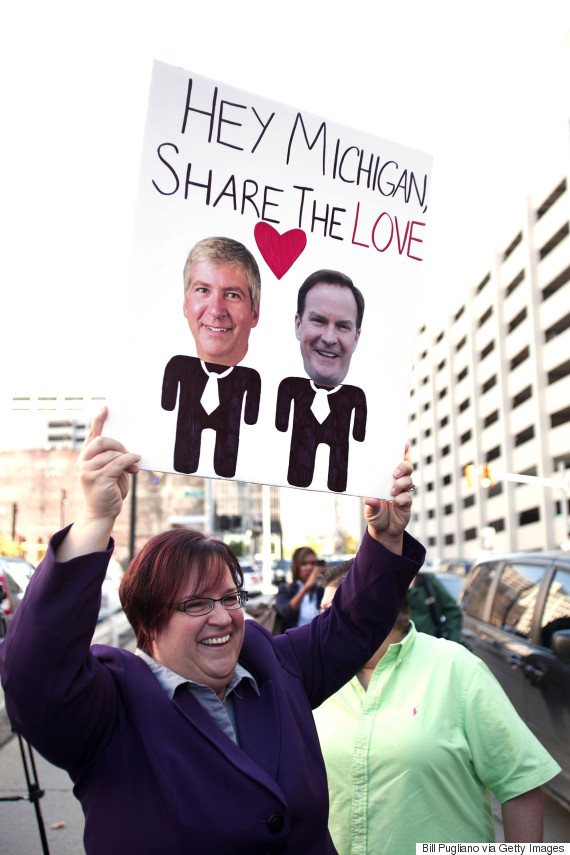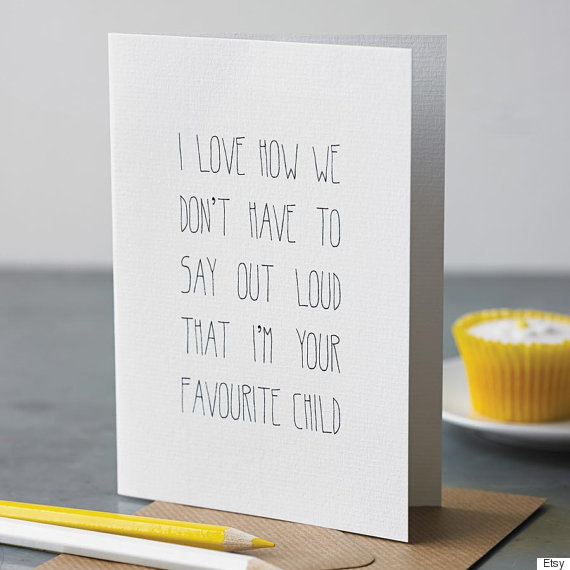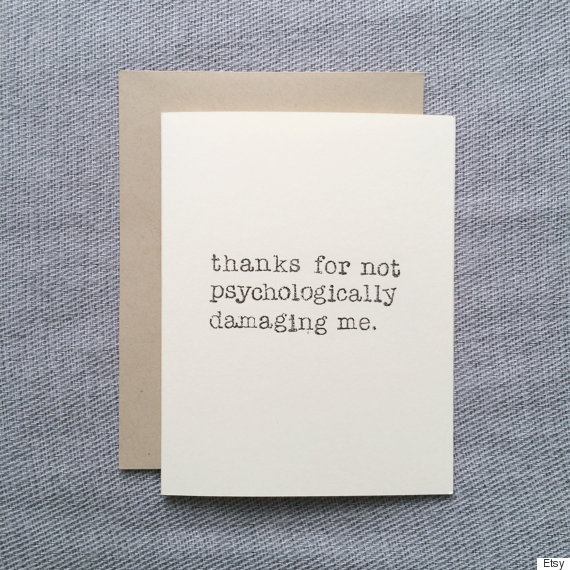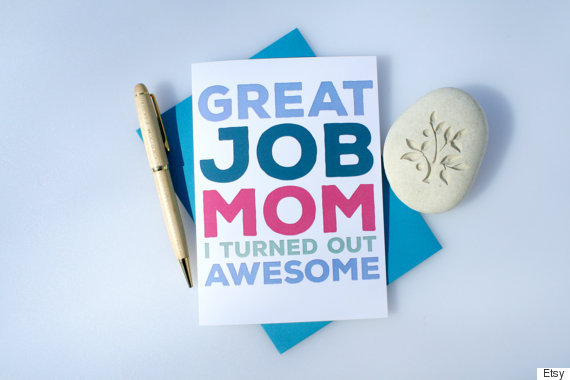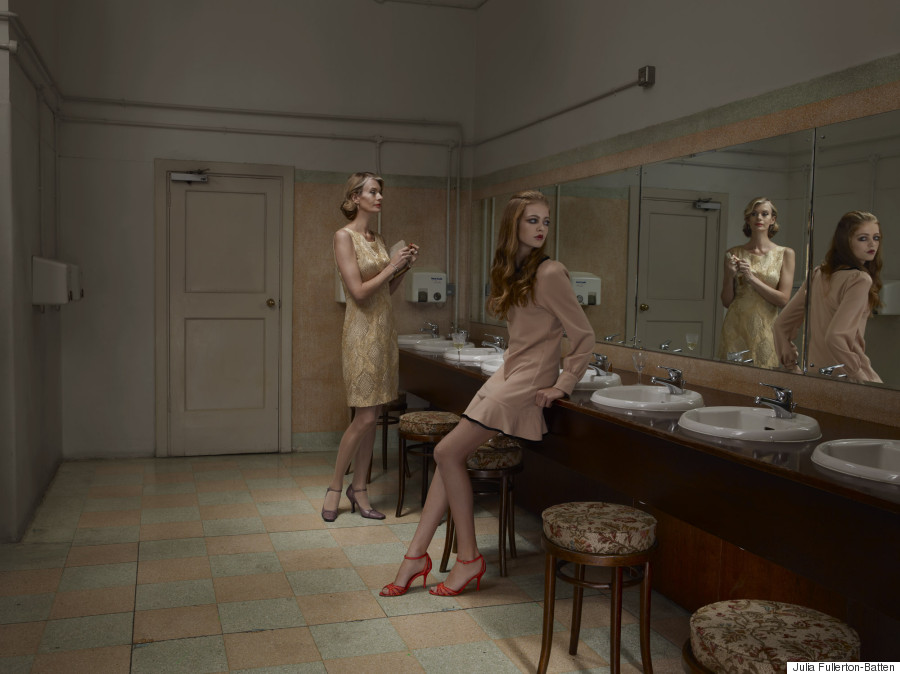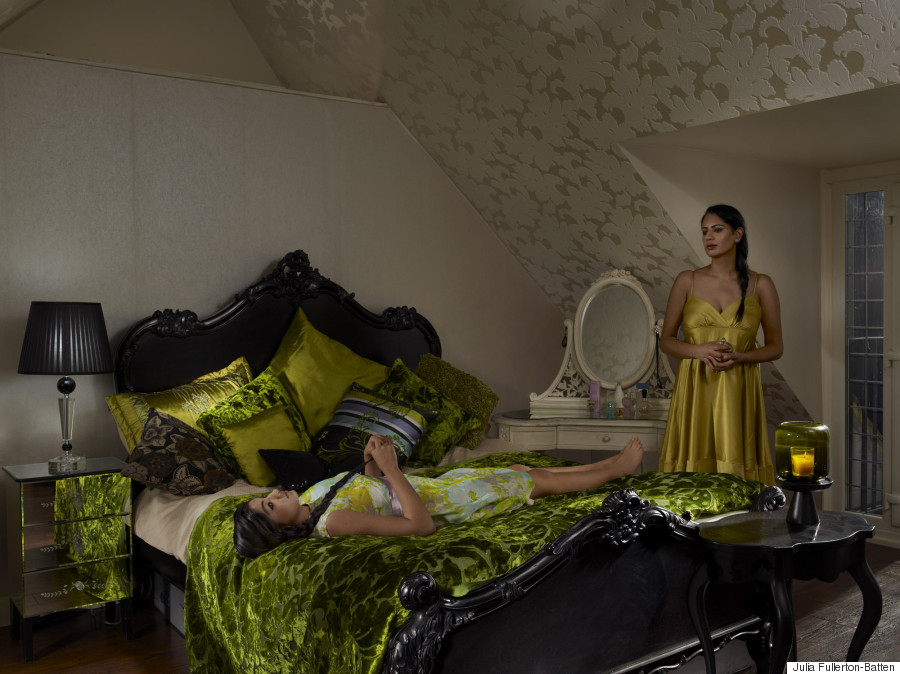LOUISVILLE, Ky. -- On this March afternoon, the smell of fried food hits you as soon as you open the doors of Our Lady of Lourdes, a Catholic parish in Jefferson County that hosts popular fish fry dinners during Lent.
Actually, this is far more than just a dinner. There's a book sale and pint-sized Girl Scouts selling cookies and desserts. Down the hall, there's a DJ hosting a dance party for the energetic kids who manage to stop running around for a few minutes to do the hula hoop contest.
But to get to the main attraction, you first have to hand over some money and place your order with Michael DeLeon, before receiving your food from Greg Bourke.
Bourke and DeLeon are two of the parish's most active members. They're also the lead plaintiffs in one of the same-sex marriage cases going before the Supreme Court this month.
The Catholic Church hasn't historically been a welcoming environment for same-sex couples. But at Our Lady of Lourdes, Bourke, DeLeon and their two children -- Bella, 16, and Isaiah, 17 -- are just like any other family. Bourke, a consultant at the health insurance company Humana, and DeLeon, who works in information technology at General Electric, have been attending the church for nearly 30 years.
"I've been here almost four years, and there might be a handful of people who are uncomfortable," said Father Scott Wimsett, the pastor of Our Lady of Lourdes. "But [Bourke and DeLeon] are loved and respected and people call them. They're involved, and you see how they fit in."
"They're just good people," Wimsett went on. "And that's kind of what it's all about, isn't it?"
Michael Eckert, a member of the parish who was also helping out at the fish fry, has known Bourke and DeLeon for years, since their sons were in Boy Scouts together. Eckert, a
former judge, said he's been paying close attention to the couple's Supreme Court case.
"It's hard to fathom how an informed individual could look at what's going on and not have an understanding of the rights of these individuals to be married," said Eckert.
Bourke and DeLeon met nearly 33 years ago as students at the University of Kentucky, at what was then pretty much the only gay bar in Lexington. They started seeing each other regularly and spending time with each other's families.
"His parents and my parents became good friends," said Bourke during a recent interview in their home. "Our families are all very close. Just like any other married couple."
![Michael DeLeon and Greg Bourke, 1986.]()
Michael DeLeon and Greg Bourke, 1986.
Bourke and DeLeon live on a quiet street just a few blocks away from Our Lady of Lourdes, in a home filled with family photos. Awards and signs from various marriage-equality events hang in the living room.
Their decision to marry in 2004 was, in part, a reaction to the wave of anti-gay sentiment and legislation then sweeping the country. While some states, like Massachusetts, were heading toward marriage equality, in other states there was a vehement backlash. Conservative legislatures were pushing for state amendments to bar same-sex marriage, and then-President George W. Bush
endorsed changing the U.S. Constitution to do the same.
Bourke and DeLeon's own state of Kentucky
outlawed same-sex marriage in November 2004. The two men decided to respond with an act of love.
Bourke, DeLeon and their two children took a vacation to Niagara Falls, Canada, since marriage equality still wasn't legal anywhere in the United States. In a room overlooking the falls, they wed in the presence of a few family members who had also flown up for the trip.
"We had a very nice wedding," said Bourke. "Our children were part of it. They were dressed for it as part of the party. And we just really had a great time."
![Greg Bourke and Michael DeLeon at their wedding in Niagara Falls, Canada, March 2004.]()
Bourke and DeLeon at their wedding in Niagara Falls, Canada, March 2004.
But their marriage still isn't legal in the state of Kentucky, and that's the issue
bringing them to the Supreme Court: Does the 14th Amendment require a state to recognize same-sex marriages that were lawfully licensed and performed out-of-state?
While they wait, they still have to deal with the very real consequences of having a marriage that's recognized by the federal government but not by their own state. For example, only DeLeon is listed as the legal parent of Bella and Isaiah.
Their
Supreme Court brief argues that if "Michael dies, Greg’s lack of a permanent parent/child relationship with the children would threaten the stability of the surviving family."
That legal distinction makes itself felt in day-to-day life in unexpected ways. For example, if Bella and Isaiah need passports, DeLeon will be the one to go with them, because in the eyes of the law, he's their only parent.
"We usually take the path of least resistance. I'm on the birth certificate, so that's going to be my thing to do," said DeLeon. "Whereas if we were both on it, either one of us could do it with no trouble."
![Greg Bourke and Michael DeLeon with their children, Isaiah and Bella, 2003.]()
Bourke and DeLeon with their children, Isaiah and Bella, in 2003.
Tax season has also been, well, taxing.
Bourke and DeLeon filed a joint return with the federal government, but filed separately with the state government. Last year was the first time they could file their federal taxes jointly, since the Supreme Court overturned the federal government's ban on recognizing same-sex marriages in June 2013.
Bourke calculated that last year, they saved $1,700 in federal taxes by being able to file jointly. This year, it was about $2,400.
It's important to speak out about these inequalities, they say, so the public can understand why same-sex marriage needs to be legalized.
Bourke and DeLeon had their marriage involuntarily thrust into the public spotlight three years ago, when Bourke lost his position as the local Boy Scout leader because of his sexual orientation.
Both men were involved in Scouting growing up and loved it. But when Isaiah came home in first grade with flyers to join Cub Scouts, they were nervous. They knew about the Boy Scouts' policies of non-inclusion and discrimination, and didn't want their son to be part of such a group.
A year later, Isaiah, now in second grade, asked again to become a Scout, since his friends were doing it and having a great time.
"We kind of reluctantly agreed to enroll him in Cub Scouts," said Bourke.
Before he knew it, Bourke was heavily involved in Scouting again as well. He served as a leader for years in both the Boy Scouts and Girl Scouts. Isaiah, for his part, recently became an Eagle Scout.
![Greg Bourke his son, Isaiah, 2013.]()
Bourke and Isaiah in 2013.
At one point, Bourke emailed an executive at the local Boy Scouts Council and informed him that he's gay.
"I wanted to open a dialogue about how we can get the membership policy changed so it's more inclusive," said Bourke, adding that in retrospect, he felt naive not to realize the can of worms he was opening. "And then all hell broke loose. They got very nasty very quickly and did everything they could get to get me out. And ultimately, they were successful."
But the community rallied behind Bourke. His troop and Wimsett, his pastor, stood up for him and refused to make him leave.
"The Boy Scouts did the one thing they could do that was left in their arsenal... Our troop charter would have been revoked if I didn't leave," said Bourke. "So because I love the troop and I love the boys and I love scouting... I resigned reluctantly."
In 2013, the Boy Scouts changed their policy, saying they would allow openly gay Scout members but not leaders. The local council did not return a request for comment on Bourke's case.
Ann Russo, who runs the Girl Scouts at Our Lady of Lourdes, was one of the few people who could keep up with the energetic Daisies and Brownies running around the dessert table at last month's fish fry. She's known Bourke and DeLeon for years and supported them during the Scouting controversy.
At the fish fry, she was looking for Bourke to give him a special Girl Scouts patch for his years of service to the organization.
"I have a lot of admiration for Greg and Michael," said Russo. "They're probably one of the first gay couples that I've gotten to know personally. And the fact that they've been together for so long just -- I mean, they were just meant to be together. It's been fun watching them post on Facebook -- their anniversaries and birthdays and things like that."
She said she was proud to be a member of the parish when Wimsett stood behind Bourke and disagreed with the Boy Scouts' policy.
"I think that any of us, as parents, want to be involved with our kids," she said. "As a Girl Scout leader, I don't talk about my sex life with any other leaders, much less children. That would never have come up."
"Gay people are not pedophiles," she went on. "And I think it's been hard for people that don't know Michael and Greg in particular -- not so much around here, because they're very accepting -- but I think in broader instances, maybe people aren't as understanding."
The Boy Scouts case was heavily covered in the
local press, where Bourke found himself increasingly speaking out on issues of equality for the lesbian, gay, bisexual and transgender community. He and DeLeon are now both involved in Scouts for Equality, a group that advocates for equal treatment in the organization.
So in 2013, when the Fauver Law Office in Louisville was looking for plaintiffs to challenge the state's marriage equality ban, Bourke and DeLeon seemed like a perfect fit.
"We were out at work. We've both been involved with GLBT alliances at work. We're out with all our family, supported by nearly all of our family, out amongst our kids' friends," said DeLeon. "So it wasn't a big decision -- the coming out. We were already out."
Bella and Isaiah likewise said they weren't worried about being put into the spotlight.
"I don't think we were really nervous about it," said Bella. "Probably more proud than anything, because it's kind of a hard thing to do -- to come out like that to pretty much everyone."
"It's kind of heroic for them to do it," said Isaiah. "They could have just sat by and not done anything. But instead, they're fighting for what they believe in."
![The Bourke-DeLeon family, 2014.]()
The Bourke-DeLeon family, 2014.
On Feb. 12, 2014, U.S. District Judge John G. Heyburn II ruled in Bourke and DeLeon's favor, finding that
Kentucky must respect same-sex marriages legally performed in other states. But in November, the U.S. Court of Appeals for the 6th Circuit ruled in favor of the state of Kentucky, upholding the ban. The issue is now in the hands of the Supreme Court.
Bourke and DeLeon said they haven't had much time to sit back and think about how they could be helping to change history and make marriage equality legal in the United States.
"It hasn't really sunk in," said Bourke.
But the two are already getting invitations to talk to the media and speak at events. They're also going to be grand marshals at the Louisville Pride Parade this spring. They'll be in Washington, D.C., for the April 28 arguments at the Supreme Court, but as of now, they're planning to stay in Kentucky for the actual decision and attend local events.
Bourke and DeLeon have always been optimistic that same-sex marriage would become legal during their lifetimes. When they wed in Canada in 2004, they said, their hope was that it would just be a matter of time before their home state recognized their marriage.
"And sure enough," said Bourke, "that's the way it looks like it's going to work out."
-- This feed and its contents are the property of The Huffington Post, and use is subject to our terms. It may be used for personal consumption, but may not be distributed on a website.















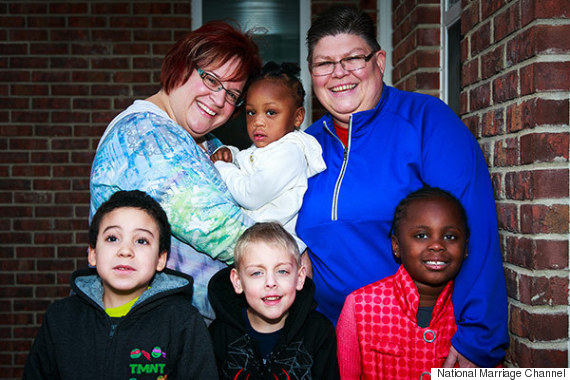
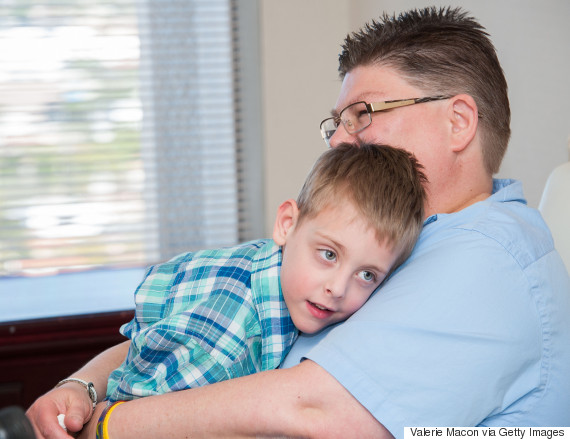 Jayne Rowse and son Jacob attend a news conference on March 6 in Los Angeles. (Photo by Valerie Macon/Getty Images)
Jayne Rowse and son Jacob attend a news conference on March 6 in Los Angeles. (Photo by Valerie Macon/Getty Images)